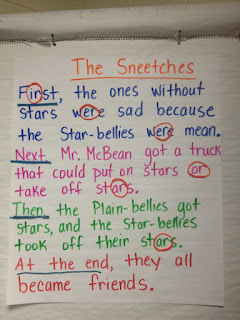Module 8 Definitions
Pretend reading (n.) - a paraphrase or spontaneous retelling told by students as they turn the pages of a familiar story book.
This is important because it is a valuable practice for movement in literacy. Children pace their retelling to match the sequence of pictures and create dialogue or the voice and cadence of written language through pretend reading.
Memory reading (n.) - an accurate recitation of text accompanied by finger-point reading.
Language experience approach (n.) -an approach to teaching reading in which students dictate to a teacher, who records their language; dictated accounts can then be used as familiar reading materials.
What we say can be written, and what we write can be read. The LEA is especially useful for students who are emergent learners. It serves as a source of motivation and engagement for students to self-generate language for themselves.
Dialogic reading (n.) - an approach to reading aloud that is designed to stimulate oral language and dialogue while enhancing students' ability to retell stories.
Dialogic reading can stimulate growth and development in expressive and receptive language when used by parents and teachers of at-risk students, particularly in early years (preschool).
Interactive read aloud (n.) - a reading format to support emergent reading where the teacher reads aloud to the students and invites discussion and other participation.
Interactive read alouds are useful and relevant in the classroom because they promote oral language discussions around vocabulary, ideas, and concepts related to the content and genre of books, passages, or texts as teachers read aloud to their children.
Mock linear (n.) - a kind of pretend writing where children beginning to write approximate the broader contours of the writing system, staring with the linear arrangement of print.
Mock linear writing is important because it is a stage in the early development phase of emergent writing. Children begin learning to write through mock linear and progress as they are taught the basics of reading and writing.
Alliteration (n.) - the occurrence in a phrase or line of speech of two or more words having the same beginning sound (e.g. Big burly bears bashed berry baskets).
Activities that use alliteration help to focus students' attention on the beginning sounds. Children do not have trouble hearing sounds, but directions like "Listen for the first sound" may confuse them. Alliteration helps students understand the concept of word in text.It is a tool to help tie phonemic awareness into learning letter-sound correspondences (i.e. phonics).
This is important because it is a valuable practice for movement in literacy. Children pace their retelling to match the sequence of pictures and create dialogue or the voice and cadence of written language through pretend reading.
Memory reading (n.) - an accurate recitation of text accompanied by finger-point reading.
Memory reading is distinct from pretend reading, although it may seem as though the child is reading when they are reading from memory. Memory reading helps children coordinate spoken language with print at the level of words, sounds, and letters.
Language experience approach (n.) -an approach to teaching reading in which students dictate to a teacher, who records their language; dictated accounts can then be used as familiar reading materials.
What we say can be written, and what we write can be read. The LEA is especially useful for students who are emergent learners. It serves as a source of motivation and engagement for students to self-generate language for themselves.
Dialogic reading (n.) - an approach to reading aloud that is designed to stimulate oral language and dialogue while enhancing students' ability to retell stories.
Dialogic reading can stimulate growth and development in expressive and receptive language when used by parents and teachers of at-risk students, particularly in early years (preschool).
Interactive read aloud (n.) - a reading format to support emergent reading where the teacher reads aloud to the students and invites discussion and other participation.
Interactive read alouds are useful and relevant in the classroom because they promote oral language discussions around vocabulary, ideas, and concepts related to the content and genre of books, passages, or texts as teachers read aloud to their children.
Mock linear (n.) - a kind of pretend writing where children beginning to write approximate the broader contours of the writing system, staring with the linear arrangement of print.
Alliteration (n.) - the occurrence in a phrase or line of speech of two or more words having the same beginning sound (e.g. Big burly bears bashed berry baskets).
Activities that use alliteration help to focus students' attention on the beginning sounds. Children do not have trouble hearing sounds, but directions like "Listen for the first sound" may confuse them. Alliteration helps students understand the concept of word in text.It is a tool to help tie phonemic awareness into learning letter-sound correspondences (i.e. phonics).
Reference
Bear, D. B., Invernizzi, M.,
Templeton, S., & Johnston, F. (2011). Words their way:
Word
study for phonics, vocabulary, and spelling instruction (6th ed.). Upper Saddle
River, NJ: Pearson.






Comments
Post a Comment